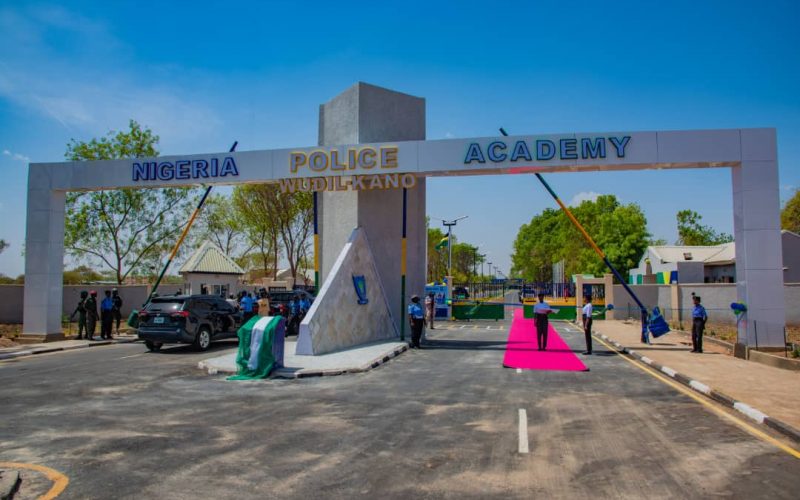Choosing the right course at POLAC is important to determining your future career path. Students aspiring to become police officers and law enforcement professionals will want to know the official list of courses and subject combinations offered by POLAC, fees, and enrollment requirements.
This article discusses the different POLAC courses and subject combinations needed for each, from law enforcement to criminology and beyond.
We will also talk about the fees, cut-off marks, and the requirements for admission.
Table of contents
- POLAC
- What are the requirements for Polac 2024?
- What is the cut off age for POLAC?
- Can you enter POLAC without JAMB?
- What is the cut off mark for POLAC 2024 2025?
- How to gain admission into Nigeria Police Academy?
- How much does it cost to go to the police academy in Nigeria?
- What are the courses offered in the police academy?
- POLAC courses and subject combination
- How many years is Nigeria Police Academy?
- FAQs
- Conclusion
- References
- Recommendations
POLAC
The Nigerian Police Academy Wudil, known as POLAC, is a government-owned university established in 1988. It is located in Wudil, Kano State, Nigeria, and is recognized for its high-quality education and training programs for aspiring police officers.
POLAC offers undergraduate and postgraduate degree programs in fields related to law enforcement and policing. These programs equip students with the skills and knowledge needed to excel as police officers.
In addition to the degree programs, POLAC offers rigorous training programs that prepare police officers to perform their duties effectively. These training programs are known for producing highly skilled and professional officers who can serve in various roles within the Nigerian Police Force.
POLAC is recognized by the National Universities Commission (NUC), the regulatory body for universities in Nigeria. This recognition ensures that the academy’s degrees and training programs meet the high standards set by the NUC.
Read: NDA Courses, Requirements for Admission and Fees | 2024
What are the requirements for Polac 2024?
To be eligible for admission to the Nigerian Police Academy (POLAC), candidates must meet the following requirements:
- Applicants must be Nigerian citizens.
- Choice of institution: POLAC must be your first choice when registering for your JAMB.
- JAMB score: An average JAMB score of 180 or above is required.
- Academic qualifications: At least five credits in WAEC, NECO, or NABTEB result, with not more than two sittings.
- Height: Male applicants should be at least 1.67 meters tall, while female applicants should be at least 1.62 meters tall.
- Chest dimension: Male applicants should have an expansive chest span of at least 86cm.
- Fitness: Physical or mental impediments may disqualify applicants.
- Academic credentials: Applicants must have obtained six (6) credits in their Senior Secondary School Certificate Examination (SSCE) from WAEC, NECO, or NABTEB, including credits in English Language and Mathematics and other subjects relevant to their chosen course.
- SSCE certificates: Only certificates obtained in 2017 or later will be accepted.
- Scores: Applicants must obtain satisfactory scores in both the written examination and the interview.
- Physical and psychological fitness: Applicants must pass physical and psychological tests to be admitted into the academy.
- Specialized courses: Additional requirements may apply depending on the course you wish to pursue.
Read Also: Yusuf Maitama Sule University Courses, Fees, and Requirements | 2024
What are the requirements for POLAC screening?
To participate in the POLAC screening process, applicants must bring the following documents with them to the screening center:
- Physical and mental fitness certificate from a government-recognized medical hospital.
- Character certificate from the Village or District Head of the applicant’s residence.
- Certificate of Origin signed by the Local Government Chairman or Secretary.
- National Identity Number (NIN) print-out.
- Original and duplicate copies of educational certificates (O’Level Result(s), Birth Certificate/Declaration of Age, and JAMB result print-out).
- Application form print-out.
- Duly completed Guarantor’s form.
- Invitation slips for the screening process.
All applicants must also wear a clean white T-shirt and shorts to the screening center. They should arrange the above documents neatly in two white flat files, with a recent passport photograph attached.
What is the cut off age for POLAC?
To be eligible for admission to the Nigerian Police Academy (POLAC), applicants must be Nigerian citizens and within a specific age range.
The minimum age for admission is 17, while the maximum is 22. Therefore, applicants older than 22 years old at the time of application will not be eligible to apply for admission to POLAC.
Also, read: 25+ Best Courses to Study In Nigeria | 2024
Can you enter POLAC without JAMB?
No, you can’t!
To be eligible for admission to the Nigerian Police Academy (POLAC), all applicants must have taken the Unified Tertiary Matriculation Examination (UTME) and achieved the minimum cut-off mark of 180.
POLAC has no separate entrance examination; instead, the UTME score is part of the admission process. This means that applicants must have taken the UTME examination and scored the minimum score required to be considered for admission.
Will POLAC accept 180?
While scoring 180 in the UTME examination does make an applicant eligible for admission to POLAC, it does not guarantee admission.
To increase your chances of admission, it is advisable to aim for a higher score in the UTME examination. This will give you a better chance of being selected for admission to POLAC.
Remember that competition for places at POLAC is high, and many applicants who meet the minimum eligibility requirements may not be admitted. Therefore, striving for the best possible score in the UTME examination is important.
Does Polac accept neco?
Yes, POLAC accepts NECO.
Candidates applying to the Nigerian Police Academy (POLAC) must have obtained a minimum of six (6) credits in their Senior Secondary School Certificate Examination (SSCE), conducted by any of the following examination bodies: West African Examinations Council (WAEC), National Examinations Council (NECO), or National Business and Technical Examinations Board (NABTEB).
These SSCE credits must have been obtained in no more than two (2) sittings. This means that the six (6) credits must have been achieved in either one or two attempts at the SSCE examination.
What is the cut off mark for POLAC 2024 2025?
The minimum score required to be eligible for admission to the Nigerian Police Academy (POLAC) is 180 in the Unified Tertiary Matriculation Examination (UTME).
This means that all applicants must score at least 180 in their UTME examination to be considered for admission to POLAC.
However, remember that the final selection process also considers other factors, including physical fitness, mental aptitude, and the availability of places.
How to gain admission into Nigeria Police Academy?
To gain admission to the Nigerian Police Academy, you must follow these steps:
- Meet the eligibility requirements, such as age, nationality, and physical and mental fitness.
- Take the UTME examination and achieve a minimum score of 180.
- Apply for admission through the POLAC recruitment portal and submit all required documents.
- If shortlisted, participate in the written examination and interview process.
- Undergo physical and psychological tests.
- Await the final selection process and admission list.
How many students does Polac admit per state?
The Nigerian Police Academy (POLAC) admits a specific number of students from each state in Nigeria. The selection process is done on a quota basis, meaning each state is given an equal number of slots.
For example, if POLAC has 1200 slots available for the incoming class and 36 states in Nigeria, each would be allocated 12 slots. This ensures that all states are represented equally in the academy.
The selection process begins at the state level, where candidates are shortlisted based on their UTME examination scores and other requirements.
Also, read: List of FUTA Cut off Mark for all Courses 2024 | Fees
How much does it cost to go to the police academy in Nigeria?
The Nigerian Police Academy (POLAC) does not charge any school fees! Students at POLAC do not have to pay anything for their education.
Instead, the Federal Government of Nigeria provides financial support to all enrolled students, which means they receive a certain amount of money to cover their expenses while studying.
This is an excellent opportunity for aspiring police officers to receive high-quality education and training at POLAC without worrying about school fees or other expenses.
Do they pay school fees in POLAC?
As an aspiring police officer at POLAC, you can rest assured that you won’t have to worry about school fees.
This fantastic opportunity allows students to focus on their studies and training without financial stress.
How much is the Polac acceptance fee?
The only financial requirement for aspiring police officers who want to enrol in POLAC is the purchase of the POLAC Admission Form.
This form costs 3,500 naira, which is very reasonable compared to the school fees charged by other universities in Nigeria.
What are the courses offered in the police academy?
Here’s a list of POLAC courses and cut off mark:
| S/N | Courses | Cut Off Mark |
| 1 | Accounting | 180 |
| 2 | Banking and Finance | 180 |
| 3 | Biochemistry | 180 |
| 4 | Biology | 180 |
| 5 | Chemistry | 180 |
| 6 | Computer Science | 180 |
| 7 | Criminology | 180 |
| 8 | Economics | 180 |
| 9 | English Language | 180 |
| 10 | Forensic | 180 |
| 11 | French | 180 |
| 12 | Hausa | 180 |
| 13 | History and International Studies | 180 |
| 14 | Igbo | 180 |
| 15 | Law | 180 |
| 16 | Linguistics | 180 |
| 17 | Management Studies | 180 |
| 18 | Mathematics | 180 |
| 19 | Physics | 180 |
| 20 | Political Science | 180 |
| 21 | Psychology | 180 |
| 22 | Social Work | 180 |
| 23 | Sociology | 180 |
| 24 | Yoruba | 180 |
POLAC courses and subject combination
Here’s a list of POLAC courses and requirements:
| POLAC Courses | JAMB Subject Combination |
|---|---|
| 1. Accounting | English, Mathematics, Economics, Any other Social Science subject |
| 2. Banking & Finance | English, Mathematics, Economics, Any other Social Science subject |
| 3. Biochemistry | English, Biology, Chemistry, Physics |
| 4. Biology | English, Biology, Chemistry, Physics |
| 5. Chemistry | English, Chemistry, Mathematics, Physics |
| 6. Computer Science | English, Mathematics, Physics, Any of Chemistry / Biology / Economics |
| 7. Criminology | English, Economics, Government, Any other Social Science subject |
| 8. Economics | English, Mathematics, Economics, Any of Government / History / Geography |
| 9. English Language | English, Literature, Any other two Arts or Social Science subjects |
| 10. Forensic Science | English, Biology, Chemistry, Physics |
| 11. French | English, French, Any other two Arts or Social Science subjects |
| 12. Hausa | English, Hausa, Any other two Arts or Social Science subjects |
| 13. History & International Studies | English, History or Government, Any other two Arts or Social Science subjects |
| 14. Igbo | English, Igbo, Any other two Arts or Social Science subjects |
| 15. Law | English, Literature, Government, Any other Arts or Social Science subject |
| 16. Linguistics | English, Any Language, Any other two Arts or Social Science subjects |
| 17. Management Studies | English, Mathematics, Economics, Any other Social Science subject |
| 18. Mathematics | English, Mathematics, Physics, Any of Chemistry / Biology / Economics |
| 19. Physics | English, Mathematics, Physics, Any of Chemistry / Biology |
| 20. Political Science | English, Government or History, Any other two Social Science subjects |
| 21. Psychology | English, Biology, Any other two Social Science subjects |
| 22. Social Work | English, Mathematics, Any other two Social Science subjects |
| 23. Sociology | English, Mathematics, Any other two Social Science subjects |
| 24. Yoruba | English, Yoruba, Any other two Arts or Social Science subjects |
Which police course is best?
If you want to pursue a career as a police officer, it’s essential to consider taking courses that will give you a strong foundation in law enforcement.
Some examples of helpful courses are criminology, legal studies, physical education, sociology, and psychology. These courses can give you the knowledge and skills necessary to be an effective police officer.
Completing college criminal justice or law enforcement coursework can make you a more attractive candidate when applying to the police academy.
See Also: Kogi State University cut-off mark for all courses | 2024/2025 Admission Requirements and Fees
How many years is Nigeria Police Academy?
The Nigerian Police Academy (POLAC) offers different programs for aspiring police officers, including a four-year Bachelor of Science degree and a shorter 18-month program.
It would be best if you were healthy for both the Bachelor’s degree and the shorter program. The 18-month program is divided into three stages: the basic stage, which lasts 6 months, the intermediate stage, which also lasts 6 months, and finally, the advanced stage, which lasts 6 months.
So, if you want to become a police officer in Nigeria, you can pursue a longer degree or a shorter, intensive program.
FAQs
Phones are not allowed during training at the Nigerian Police Academy. This helps maintain discipline and focus.
The POLAC entrance exam consists of approximately 39 multiple-choice questions covering the Bible, Nigerian history, government, politics, and economics. It is only a practice exam to prepare applicants for the real post-UTME exam.
Getting the POLAC past questions is very beneficial for aspiring police officers. It will give you an idea of the type of questions that may be asked, and since questions are sometimes repeated, it can help increase your chances of scoring high on the entrance exam.
Conclusion
That’s it! Aspiring police officers in Nigeria can choose from the list of courses in POLAC, with options for both short-term and long-term studies.
Good health is required for both programs, and the entrance exam tests knowledge in various subjects. Also, getting past questions is helpful because some may be the same. With this information, you can decide how to become a police officer in Nigeria.
References
- fhc-ng.com – POLAC Admission
- en.wikipedia.org – Nigeria Police Academy Wudil
- polac.edu.ng – POLAC courses
- schoolcontent.info – JAMB brochure for NPA
- timeshighereducation.com – Nigerian Police Academy, Wudil





